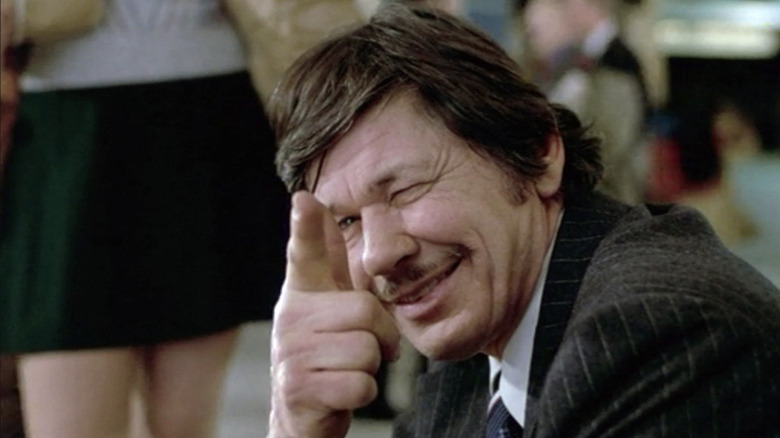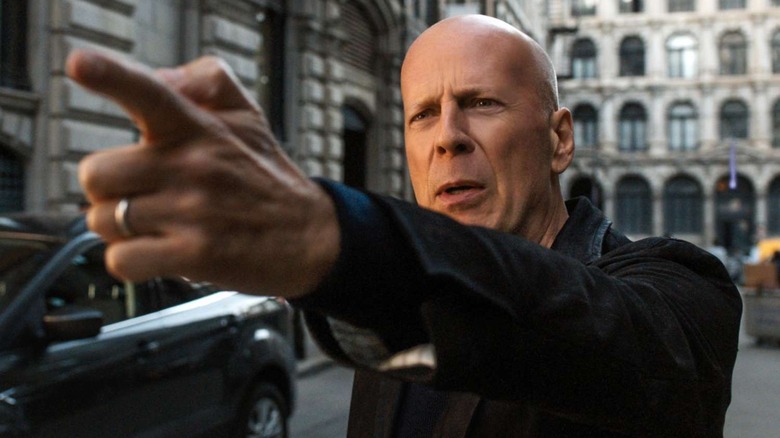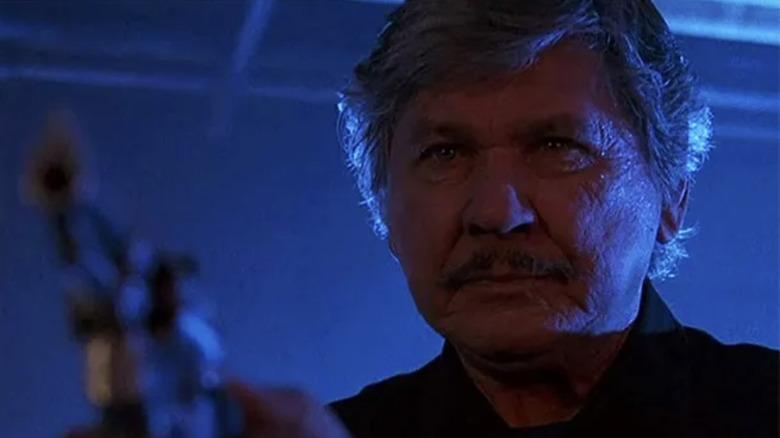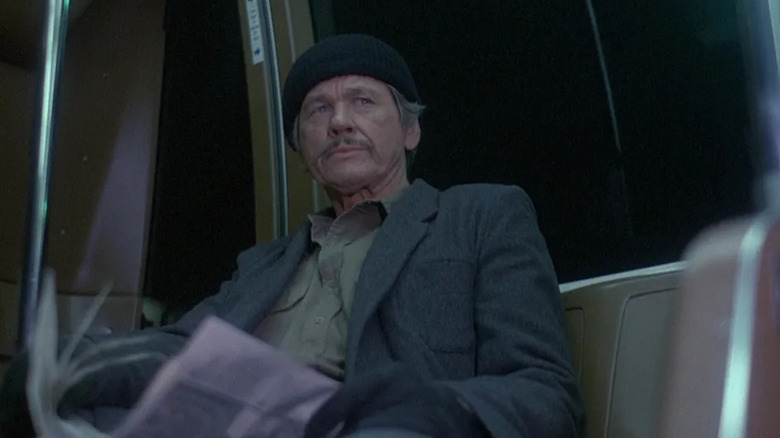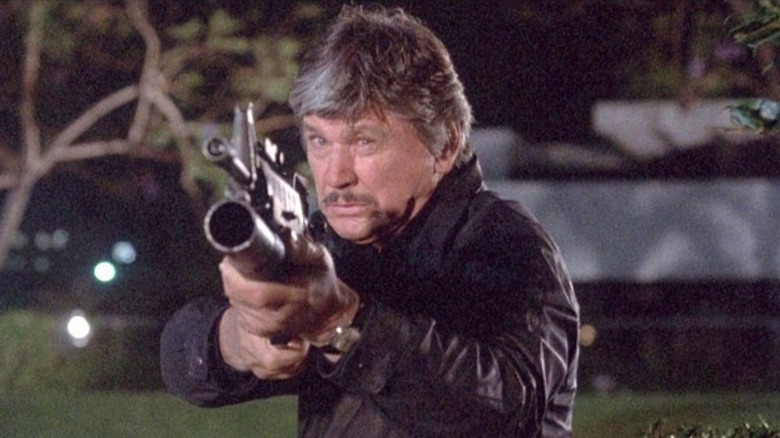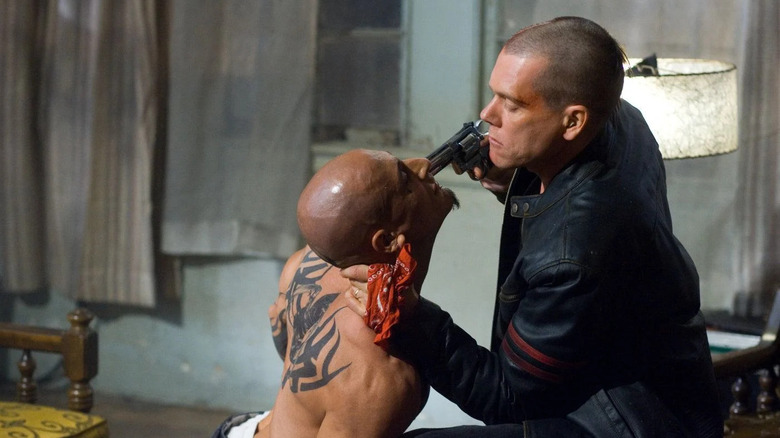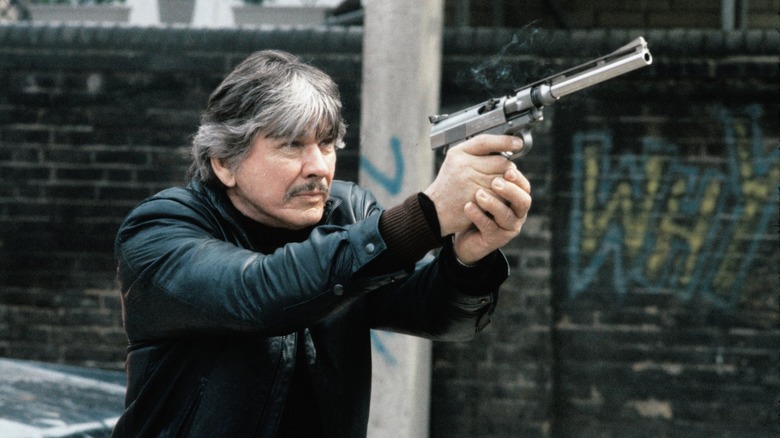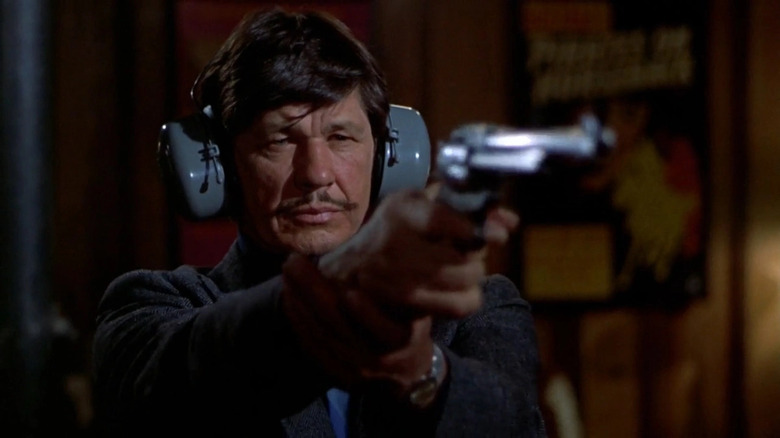Every Death Wish Movie Ranked
When director Michael Winner and screenwriter Wendell Mayes adapted Brian Garfield's novel "Death Wish," it's doubtful that they had any idea they'd be launching a film franchise that would change the landscape of vigilante thrillers forever, and solidify Charles Bronson as one of the greatest stars of action cinema. The "Death Wish" films start out as a twisted character study of a man named Paul Kersey as he slowly descends into a life of vengeance and violence, bearing arms and serving as a one-man judge, jury, and executioner. There's a real allure to righting wrongs outside of the American justice system, but as Kearsey's arc shows, his desire to kill has perhaps always been a part of him — which makes him part of the problem.
As the franchise went on, the "Death Wish" films cared less and less about the moral conundrums of its hero and instead wanted to showcase Bronson being a badass killing bad guys and the type of miscreants that conservatives believe are bringing the downfall of society in a flurry of gun porn. With a remake, an unofficial spin-off, and five direct films — here are all of the "Death Wish" films, ranked.
7. Death Wish (2018)
WOOF.
Gonna be real, I was tempted to leave my blurb about this film with just that. Eli Roth's remake of the 1974 original is, uh, not great, Bob! This is the shining example of a "who asked for this?" remake, where everything good is just pulled straight from the source and (mostly) everything different drags the film down. I will give Roth this: the gore scenes are as good as what should be expected from the guy who gave us "Cabin Fever" and "Hostel." Unfortunately, this is a movie a lot of alt-right f***wits and Proud Boys like to claim as their own, which tells you everything you need to know about the film's approach to justifying vigilante justice. Roth made a "Death Wish" film that embodies everything the first one was accused of being (but actually wasn't) — a male power fantasy where the only thing that can stop a bad guy with a gun is a good guy with a gun. Barf. Pass. Boo. Get off my screen.
6. Death Wish V: The Face of Death
The last appearance of Charles Bronson as Paul Kersey and his final theatrical release, "Death Wish V" heads back to New York City where Kersey takes on a new identity, Paul Stewart, and loses yet another romantic partner when a mobster kills his girlfriend. Now in his 70s, Charles Bronson isn't bringing the action heat like he once was, so the film is instead all about letting him have a good time. There is, unfortunately, a major scene that is centered around a transphobic trend in cinema that is still a political talking point to this day when Robert Joy's character Freddie Flakes dresses in drag to stalk Kersey's girlfriend into a public bathroom so he can bash her face into a mirror.
Let this be a reminder — if your fear about trans accessibility in the bathroom is that men will dress like women and harm women, your issue is not with trans women, but with abusive men. It's a huge bummer that it's a plot point because it adds additional tarnish to a movie that should have been a last hurrah. Anyway, the villains are goofy as hell and the supporting cast is having a ball of a time, but this feels less like a "Death Wish" movie and more like a going away party for Charles Bronson. Leave the gun, take the cyanide-laced cannoli.
5. Death Wish II
Eight years after the original film, the second installment of the "Death Wish" franchise moved Paul Kersey out of Manhattan and into the mean streets of Los Angeles. He's trying to recover and move on from the first movie's events and start anew, but Kersey just can't catch a break. He has a run-in with a gang of Street Punks that look like rejected audition groups for one of the gangs in "The Warriors," who end up brutally assaulting and murdering his housekeeper, attacking his new girlfriend, and killing his daughter just after she's returned from the mental institution.
Kersey, of course, takes matters into his own hands to destroy these punks, but "Death Wish 2" is the "Rambo: First Blood Part 2" of the "Death Wish" series. It's hyper violent, littered with graphic scenes of sexual assault, and none of the harrowing events feel like there's any real purpose behind any of them. Sure, it's a well-made action film and Bronson still gets to be Bronson (aka a total badass), but there's a mean streak to this film that feels unearned and cheap. Perhaps it was because too much time had passed and Michael Winner needed to regain his bearings, but "Death Wish II" wasn't the return many fans had hoped for.
4. Death Wish 4: The Crackdown
Another Los Angeles revenge thriller, "Death Wish 4: The Crackdown" was the franchise's response to the crack epidemic of the 1980s and the war-on-drugs/tough-on-crime era of Reagan's presidency. It's the first film to not be helmed by Michael Winner, and ... it shows. Kersey's got a new girlfriend, but her daughter dies from a crack cocaine overdose. When a tabloid journalist learns that Kersey is a vigilante, he decides to link up with him to try and destroy the L.A. drug trade. Of all the "Death Wish" films, this one has arguably the most laughably aged politics, existing as a conservative fantasy more than any other film. The best way to fight drugs and get tough on crime is with excessive violence, apparently!
Fortunately, if you separate the ridiculously problematic logic behind the film's shoddy politics and suspend your disbelief, the violence is absolutely bananas and still a lot of fun. Bronson does not want to be in this movie, but everyone around him is trying their hardest to prove their worth acting alongside him. The climax also incorporates a bazooka, which is never a bad decision as far as I'm concerned. It's a little basic in terms of the revenge plot, but I don't think folks are tuning into these sequels for anything more than an hour and a half of Bronson bodying bad guys. It's serviceable, it's watchable, just don't think too hard or the entire plot falls apart.
3. Death Sentence
Okay, so you might be wondering why this random James Wan movie from 2007 ended up on this list, but hear me out. "Death Sentence" is loosely based on Brian Garfield's novel of the same name, which is a sequel to his "Death Wish" novel, so technically that puts this film under the franchise's umbrella. It has absolutely nothing to do with Charles Bronson, nor is it a remake of Michael Winner's films, but a standalone film tangentially related to the series so many people hold near and dear. It's also, for my money, a ridiculously fun vigilante thriller despite the initial critical disdain and flop at the box office.
Kevin Bacon stars as Nick Hume, a father who witnesses his son killed by a gang member who slashes his throat with a machete. The killer gets a light sentence because our legal system is broken beyond repair, so Nick takes matters into his own hands. Garfield notoriously hated the way the "Death Wish" films were turned into mindless action flicks that completely missed the point of his original novel, but spoke highly of the empathetic hand Wan applied to "Death Sentence." Hume is a father pushed too far, but themes of survivor's guilt coat every single action. For each bombastic action scene, there's a wallop of heart to even the score.
Looking at the film within Wan's filmography is also fascinating because Nick Hume is written with the same approach as every character Patrick Wilson has ever played in a James Wan horror film. "Death Sentence" zeroes in on why vigilante justice isn't always the answer, and that violence begets more violence. It deserves a rewatch because it's not just an underrated Wan film, but a totally underrated "Death Wish" film too.
Oh, and John Goodman plays a tough-as-nails arms dealer.
2. Death Wish 3
Remember how I said Brian Garfield hated the fact the "Death Wish" films became a sequel-churning machine that completely lost sight of the novel's intent? Yeah, he was referring to films like "Death Wish 3," which were, as Garfield stated, "Nothing more than vanity showcases for the very limited talents of Charles Bronson." Look, he's not wrong, but that doesn't change the fact that "Death Wish 3" absolutely rips. Kersey's got another personal connection pushing him back into the world of vigilante justice, this time after his Korean War buddy Charley is killed in the middle of a turf war between rival gangs.
This is where the "Death Wish" films completely pivot away from Garfield's intent with the novels, but at least decides to have a lot of fun with it. The violence escalates to cartoonish levels of nonsense, and the film has absolutely no idea what tone it wants to have. The result is a rip-roaring good time filled with unintentional moments of comedy and balls-to-the-wall action set pieces that defy logic. It set the tone for the franchise moving forward (for better and worse), and had fun in the process.
1. Death Wish (1974)
The original "Death Wish" became one of the most controversial films of its time, with an ultra-violent streak that shocked the nation. While arguably tame by today's standards, Charles Bronson's turn as a regular man fighting crime after his wife is killed and the police do little about it completely changed the trajectory of his career. It's the performance he'd become synonymous with, and a film that would solidify an entirely new subgenre of action thrillers.
But if you strip away all of the violence and vigilantism of the "Death Wish" films, Paul Kersey is still a relatable protagonist to this day. He's a man who believes in people and sees that the system is broken, so even when he's pushed to the brink, audiences still look at him and think, "I get it. I may not like it, but I get it." Paul Kersey is the everyman who finally gives the system a middle finger and decides to take matters into his own hands. The original "Death Wish" film poses the impossible question: "What would we do if the world robbed us of the people most precious to us?" And for the majority of us, that knee-jerk reaction is, "I'll kill them."
Fortunately, most people don't actually follow through on that impulse, but Paul Kersey does, and provides a cathartic bit of escapism for anyone who has ever felt that way.
